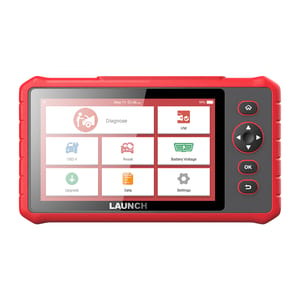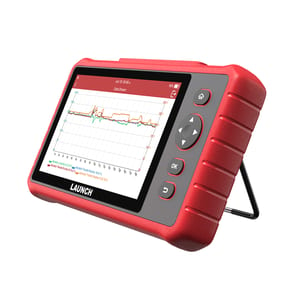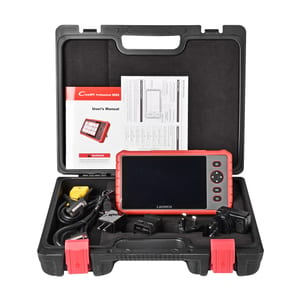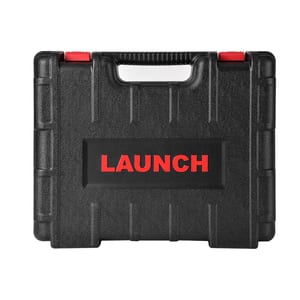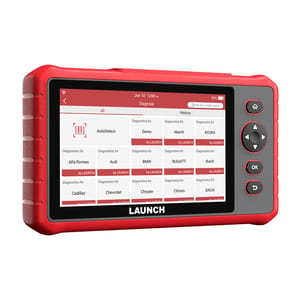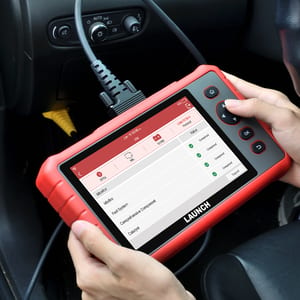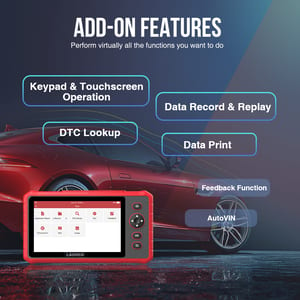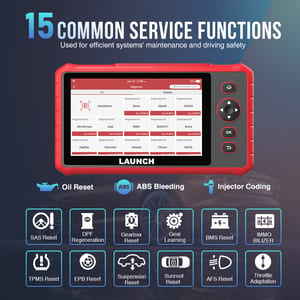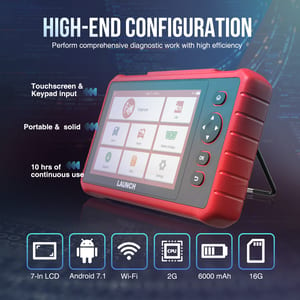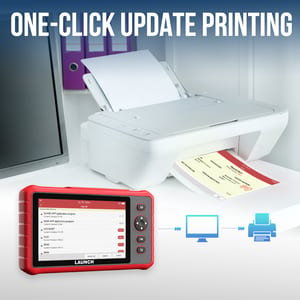Launch CRP909X
Discover the Power of Efficiency with the Launch CRP 909X OBD2 Diagnostic Tool
Embark on a seamless diagnostic experience with the Launch CRP 909X, your ultimate companion in advanced vehicle diagnostics. Bridging the gap between simplicity and professional performance, the CRP 909X brings an unparalleled level of competence, catering to all your diagnostic needs with swift, accurate results. Whether you're a professional mechanic, a car enthusiast, or a workshop owner, this tool is crafted to streamline your diagnostic and maintenance process, making vehicle upkeep as effortless as a breeze.
Product Highlights:
- Comprehensive Diagnostic Functions
- OBFCM Support
- Advanced Hardware Technology
- Wide Vehicle Coverage
- Intuitive User Interface
- One-click Wi-Fi Updates

- Intro
- Supported car brands
- What diagnostics functions does the Launch CRP909X have?
- OBD2/EOBD general tests and functions
- What basic maintenance functions does the CRP909X have?
- What advanced maintenance functions does the CRP909X have?
- What languages are supported?
- What's included with the CRP909X?
Effortless performance at your fingertips:
The Launch CRP 909X is engineered for precision and efficiency, offering extensive vehicle coverage for more than 10,000 car models from over 57 constructors. Its cutting-edge technology ensures complete diagnostic functions, ranging from reading and clearing codes to advanced functionalities like active tests, adaptation, and matching.
Superior hardware and software integration:
Equipped with a 7-inch touchscreen and a powerful quad-core processor, the CRP 909X guarantees a smoother user experience and faster diagnostic analyses. The Android-based operating system is easy to navigate, making professional diagnostics accessible for everyone.
All-in-One diagnostic solution:
This tool doesn't just read codes; it enhances your diagnostic capabilities with advanced features like the 15 special functions, including Oil Reset, EPB Reset, SAS Reset, BMS Reset, DPF Regeneration, and more. These features ensure you're equipped to handle not just basic troubleshooting, but comprehensive and complex vehicle maintenance tasks.
Unparalleled vehicle compatibility:
Whether working on older OBD2 vehicles or the latest models, the CRP 909X's wide compatibility and easy updates through Wi-Fi ensure you're always ready to meet the needs of any vehicle that rolls into your shop.
Live data and recording:
Monitor your vehicle parameters in real time, and capture the data streams for deeper analysis. This feature helps in understanding intermittent issues and performance under different operating conditions.
Supported car brands
| Abarth | Honda | Mitsubishi |
| Acura | Hyundai | Nissan |
| Alfa Romeo | Infiniti | Opel |
| Audi | Isuzu | Perodua |
| Bentley | Jaguar | Peugeot |
| BMW | Jeep | Polestar |
| Bugatti | Kia | Porsche |
| Buick | Lamborghini | Proton |
| Cadillac | Lancia | Renault |
| Chevrolet | Landrover | Rolls-Royce |
| Chrysler | Lexus | Saab |
| Citroen | Lincoln | Seat |
| Dacia | Lynk & CO | Skoda |
| Daewoo | Mahindra | Smart |
| Daihatsu | Maruti | Sprinter |
| Dodge | Maserati | SsangYong |
| Fiat | Maybach | Subaru |
| Ford | Mazda | VAZ |
| Genesis | Mercedes | Volkswagen |
| GM | Mini | Volvo |
| Holden | Mitsubishi |
What diagnostics functions does the Launch CRP909X have?
Vehicle Identification: The Launch Creader Professional CRP909X supports four methods for vehicle identification:
- Automatic VIN Scan: The Launch Creader Professional CRP909X is equipped with the latest automatic VIN scanning function, allowing for quick identification of vehicles through the CAN network with just one click.
- Manual VIN Entry: For vehicles that do not support automatic VIN scanning, the Launch Creader Professional CRP909X offers the option to manually enter the vehicle VIN.
- Manual Vehicle Selection: When the vehicle's VIN cannot be automatically retrieved from the ECU, the Launch Creader Professional CRP909X allows for the manual selection of the vehicle.
- Alternative Vehicle Identification: If the Launch Creader Professional CRP909X cannot identify the vehicle, you can perform the diagnosis via the generic EOBD option.
Automatic and Manual Scan: When you have access to the diagnostic section, two scan options are available:
- Automatic Scan: Initiates an automatic scan for all available modules in the vehicle.
- Manual Scan: Initiates a manual diagnosis for the selected module in the vehicle.
Automatic scan:
The "Automatic Scan" function is a practical and comprehensive diagnostic option that automatically scans all available modules in the vehicle. This function quickly and efficiently provides an overview of the current control modules and detects any error codes. During the automatic scan, all modules are checked for error codes, with the status displayed as follows:
- Red - An error code has been detected in the control unit.
- Green - No error codes have been found in the control unit.
Manual scan:
The "Manual Scan" function, in addition to the automatic scan, offers the ability to select specific control modules in the vehicle for targeted diagnosis. With this function, you can manually determine which module you wish to scan and analyze. By selecting a specific control module manually, you can focus on a particular system or component of the vehicle. This is especially useful if you suspect a problem that you want to identify or carry out a specific procedure.
Components of the manual scan may include:
- ECU Information
- Reading Error Codes
- Clearing Error Codes
- Live Data
OBD2/EOBD general tests and functions
The EOBD/OBDII tests offer you a quick way to check the system for emission-related components when the engine management light is on.
Reading Fault Codes: Through the 'Read Fault Codes' menu, you can read the stored, pending, and permanent fault codes that have been identified in the control unit.
Clearing Fault Codes: With the 'Clear Fault Codes' menu, you can erase all current and stored fault codes from the control module.
Live data:
With the 'Live Data' menu, you can view, record, and playback the real-time PID data from the electronic control module.
- View Data: The 'View Data' function allows you to see the real-time PID data from the vehicle's electronic control unit, including sensor data, and operation of switches, coils, and relays.
- Record Data: The 'Record Data' function captures PIDs to assist you in diagnosing intermittent driving problems that cannot be identified otherwise.
- Playback Data: 'Data Playback' allows you to review the recorded PID data.
Freeze frame:
The 'Freeze Frame' menu provides a snapshot of critical operational conditions of the vehicle that are automatically recorded by the onboard computer at the time a fault code is identified. This function is useful for determining under what operational conditions the error occurred.
I/M readiness:
With 'I/M Readiness,' you can view a snapshot of the operation of the OBDII/EOBD vehicles' emission system.
O2 sensor monitor test:
According to OBD II regulations, certain vehicles should be monitored and tested for oxygen sensors (O2) for emission-related failures. The 'O2 Sensor Monitor Test' function is used to retrieve the completed O2 sensor monitor test results.
EVAP system test:
The 'EVAP Test' function allows you to initiate a leak test for the vehicle's EVAP system. The Launch Creader Professional CRP909X does not perform this leak test but signals the vehicle's onboard computer to initiate the test.
On-board monitor:
The 'On-Board Monitor Test' function is useful after maintenance or after clearing a vehicle ECU's memory. For non-CAN vehicles, this function receives test results for emission-related powertrain components and systems not continuously monitored. For CAN vehicles, it receives test data for emission-related powertrain components and systems that are monitored both continuously and non-continuously.
Component test:
The 'Component Test' function allows the Launch Creader Professional CRP909X to check the operation of vehicle components or systems.
Vehicle information:
The 'Vehicle Information' function enables you to retrieve the Vehicle Identification Number (VIN), Calibration Identification Numbers (CIN's), and calibration verification numbers.
Vehicle status:
This function is used to check the current status of the vehicle, including communication protocols of OBD II modules, the number of retrieved fault codes, the status of the Malfunction Indicator Light (MIL), and other relevant information.
ECU information:
This function allows you to read specific information stored in the ECU, such as: module number, control unit type, software encoding number, software version number, hardware part number, and hardware version number.
Reading error codes:
This function enables the analysis of error codes detected by the control module. These codes provide crucial information about potential problems in the vehicle, assisting in locating and identifying issues.
Clearing error codes:
This function allows current and stored error codes to be removed from a selected control module. This is useful for verifying whether issues have been resolved after repairs and for resetting warning lights on the dashboard.
Live data:
This function provides real-time access to the current parameters of vehicle sensors, allowing the status and performance of systems and components to be monitored. The data can be displayed in various modes, depending on the user's preference.
- Text Mode: This displays the parameters in a text format, presented as a list.
- Waveform Graph Mode: This allows you to view the parameters in the form of waveform graphs.
- Combining Graphs: This mode combines multiple graphs to enable comparisons between different parameters.
OBFCM Support:
Can read the fuel consumption and return it to the authorities for the MOT. This is mandatory in Europe as of January 1, 2024.
What basic maintenance functions does the CRP909X have?
Under the umbrella of basic maintenance, certain routine and critical procedures are quintessential in preserving the optimal performance of your vehicle. The 'Basic Maintenance Functions' encompass a set of tasks that can be performed with minimal expertise, yet have profound implications for the longevity and operational efficiency of your car. This section delves into straightforward yet essential maintenance activities, from oil resets to battery management and beyond, all aimed at ensuring your vehicle runs smoothly and reliably. Embracing these practices will not only enhance your vehicle's performance but also significantly ward off inconvenient and potentially expensive issues down the road.
Activating service interval reset:
Streamline your vehicle's maintenance schedule with the ability to efficiently reset your service indicators. Once you've completed specific maintenance activities, this feature allows you to wipe your vehicle's service interval records clean, starting afresh from zero. This process not only turns off the service alert but also primes the system, marking the beginning of a new maintenance journey. This functionality is indispensable after comprehensive procedures like oil changes, new oil filter installations, or other significant service milestones. By utilizing this feature, you're maintaining a precise log of your vehicle's upkeep history, ensuring you're always one step ahead when it comes to scheduling future maintenance, ultimately keeping your vehicle running at peak performance.
Electronic parking brake (EPB):
Step into the realm of advanced maintenance with the capability to recalibrate your vehicle's rear electronic parking brakes. This isn't just a simple reset; it's often a mandatory measure when you're dealing with replacements within the brake system, including rear brake pads, discs, pad sensors, or calipers. Realigning the electronic parking brake post-service is not just a step but a necessity to ensure this critical safety feature functions flawlessly. Neglecting a proper realignment could compromise brake performance, potentially endangering your vehicle's safety credentials and those inside. It's about maintaining not just performance but also safety and reliability.
Initiating DPF regeneration process:
Take control of your vehicle's health with the ability to prompt your engine's management system (ECU) to start a vital regeneration cycle, a key process for maintaining the full functionality and extending the life of your diesel particulate filter. This comprehensive maintenance capability doesn't stop there; it also empowers you to reset and recalibrate various system components or sensors following a replacement, which is indispensable after installing new critical parts like the NOx sensor, diesel particulate filter, or sensors monitoring exhaust gas pressure. This feature is not only essential in situations where your diesel particulate filter demands an immediate regeneration cycle. It plays a pivotal role in optimizing your vehicle's overall performance, assisting in cutting down harmful emissions, and fostering enhanced fuel efficiency. With this function, you're not just fixing immediate issues; you're investing in the smoother, more environmentally friendly, and cost-effective operation of your vehicle.
Steering angle sensor reset (SAS):
This maintenance task involves recalibrating the steering angle sensor to identify the steering's neutral (zero) position accurately. This step becomes particularly crucial following the replacement of the steering angle sensor or the G-sensor. By ensuring precise recalibration, the steering angle adjustment systems maintain peak performance, significantly enhancing your vehicle's safety and operational effectiveness. Therefore, the SAS reset process is vital in preserving the specific steering responsiveness and driving stability expected in contemporary vehicles.
Battery management system initialization (BMS):
This maintenance function allows users to reset the battery monitoring unit, a critical step in ensuring precise communication between the battery sensor and the vehicle's systems. This feature is particularly crucial when there's a replacement of the main battery or the battery sensor. By properly initializing and maintaining the BMS, users can guarantee the battery's optimal performance and lifespan, thereby enhancing the vehicle's overall efficiency and reliability.
What advanced maintenance functions does the CRP909X have?
In the realm of vehicular care, 'Advanced Maintenance Functions' play a pivotal role in fortifying the technical health and augmenting the performance parameters of your vehicle. These are specialized procedures that go beyond the surface of routine checks, addressing the complex components that are crucial for the sophisticated operations within your vehicle. This section introduces a series of advanced tasks, from intricate system recalibrations to the nuanced diagnosis of electronic units. Mastery of these functions is instrumental in preempting critical failures, sustaining peak performance, and extending the vehicle's operational lifespan. While these tasks are more technical, they are indispensable for those committed to maintaining a vehicle's advanced functionalities and ensuring its longevity in the face of constant technological evolution.
Reinitializing injectors:
Harness the power of precision with the capability to recalibrate the programming of diesel injectors within the Electronic Control Unit (ECU). This pivotal process is a game-changer in maintaining the precise delivery of fuel to your engine cylinders, a cornerstone for your vehicle's performance and fuel economy. When faced with new circumstances like a replaced ECU or injectors, deploying this maintenance feature is key to seamless component integration, ensuring your vehicle's revamped parts are operating in harmony. This recalibration is not just about resetting; it's about fine-tuning your vehicle's fuel dynamics. The result? Peak performance parameters and fuel-efficiency metrics that can set new standards in your driving experience.
Initiating AdBlue system reset:
Embrace the efficiency of starting anew with the feature that allows you to restore your AdBlue system back to its original factory settings. Undergoing certain repairs or maintenance, like installing a new AdBlue injector, refilling the AdBlue tank, or swapping out vital parts within the AdBlue infrastructure, often necessitates this kind of system rejuvenation. By initiating this reset, you're not just reverting to default settings; you're optimizing the system to operate at its prime, just as the manufacturer intended. This action is integral to unlocking the vehicle's full potential, driving its performance forward, and minimizing harmful emissions. Essentially, it's about hitting the refresh button to propel efficiency and environmental responsibility in your vehicle's daily operations.
Throttle body initialization (ETC):
Unlock the pathway to pristine engine performance with the feature dedicated to recalibrating your throttle body settings, reverting them to their out-of-the-box perfection. Commonly referred to as throttle body initialization, this crucial process is the key to harmonizing engine functionality and fuel consumption efficiency. What does it actually do? It rejuvenates the throttle body's 'learned values,' the tailored settings your engine management system has meticulously adjusted over time for peak performance. Especially after events like throttle body replacements, cleanings, or even battery disconnections, this reset becomes necessary. That's because these scenarios may alter your engine's finely-tuned equilibrium. With this reset, you're essentially giving your vehicle a fresh start, ensuring it continues to operate at its optimal level, just like it did when it first rolled off the assembly line.
Air/Fuel mixture reset (A/F):
Step into the realm of optimized vehicle performance with the capability of fine-tuning your air-to-fuel ratio. This balancing act is more than a setting; it's the lifeline of your vehicle's performance, fuel efficiency, and emission outputs. Tweaking this ratio to perfection can unlock a world of enhanced engine vitality and reduced environmental footprint. The air/fuel reset feature becomes particularly indispensable when you're dealing with shifts in fuel quality or octane levels, ensuring your engine maintains its top-tier performance. It's not just about adapting; it's about transcending changes to fuel conditions, guaranteeing your vehicle operates at its peak, irrespective of external factors.
Transmission reset (CVT):
Dive into seamless gear transitions with the feature engineered for restoring and recalibrating your transmission settings back to their factory precision. This isn't just a reset; it's essential maintenance that ensures your gearbox operates with the smoothness and efficiency it was originally designed to deliver. This kind of system rejuvenation is particularly crucial after intensive transmission interventions, like disassembly or in-depth repairs. By reinitiating and fine-tuning the transmission's settings, you're not just restoring; you're enhancing its functionality post-service, ensuring smoother gear shifts and heightened efficiency. Consider this feature a vital part of your vehicle's preventive care, an investment in the extended longevity and optimized performance of your transmission system. It's not merely about maintaining standards but elevating the entire driving experience.
Crankshaft position sensor reset (TEC):
Engage in the precision of engineering with the feature designed for re-educating your crankshaft's gear operational tolerance to the crankshaft position sensor. This initiation is far from a simple task; it's a cornerstone in vehicle maintenance, particularly when you're switching out pivotal components like the ECU, the sensor itself, or the crankshaft's flywheel. It also becomes critical if the trouble code P1336 surfaces. Executing this procedure with accuracy is not just beneficial but necessary for the motor's ideal operation, assuring precise ignition timing and fuel injection. Ultimately, it enhances your vehicle's overall functionality and efficiency. It's not just a maintenance step; it's the safeguard for your engine's harmony and vehicle's performance fidelity.
Bleeding the ABS pump (ABS):
Embrace the precision of maintenance with the ability to purge air from your ABS system, a cornerstone practice for reinstating absolute braking pressure. The presence of air bubbles in the brake lines can sabotage your braking effectiveness, inviting potential hazards. Especially after interventions involving the ABS module, pump, master cylinders, or even the brake lines themselves, executing a thorough bleed of the ABS system is paramount. This procedure isn't just about enhancing; it's about resurrecting the brake system's optimal responsiveness, ensuring each drive is as safe and efficient as possible.
Tire pressure monitoring (TPMS):
Dive into hands-on maintenance with this feature, dedicated to seamless interaction with your vehicle's tire pressure surveillance system. This function isn't just about resetting the tire pressure warning light; it's your first line of defense. Whether you're dealing with dangerously deflated tires, new tire pressure sensors, or fresh rubber on the wheels, this feature is indispensable. It's not just about keeping your tires in check; it's about embracing a commitment to proactive vigilance and ensuring your vehicle's performance stays in its prime.
Air suspension initialization:
This maintenance activity is dedicated to calibrating your vehicle's suspension systems. Such calibration is pivotal in maintaining the appropriate body height, contributing significantly to the vehicle's overall performance and safety. This becomes especially pertinent when alterations have been made to the body height sensor, the air suspension system, or the control module. It may also be required if the vehicle's level deviates from standard specifications. By keeping this calibration in check, you ensure optimal road handling, driving comfort, and prevent potential damage to the vehicle's suspension or tires.
Adaptive headlights initialization (AFS):
This maintenance feature allows for the resetting of the adaptive headlights' settings. The AFS system is vital for vehicle safety, adjusting illumination based on ambient light intensity. It automatically activates the headlights and timely adjusts the lighting angle based on the vehicle's speed and position. Reinitializing the AFS system is highly advised after component replacements such as the adaptive headlights themselves, the level sensor, or xenon bulbs, ensuring the system functions accurately and provides optimal visibility under varying driving conditions.
Immobilizer initialization (IMMO):
This maintenance function assists in re-synchronizing the key with the vehicle's immobilizer system, a crucial step in unlocking the immobilizer. Re-synchronization is often necessary after replacing components such as the ignition key, ignition switch, or key battery. By re-pairing the key and the system, it ensures that the communication between these components remains optimal, which is vital for the proper operation and security of the vehicle.
Seat occupancy sensor initialization (SRS):
This maintenance task enables the calibration of the airbag's seat occupancy sensor. Such calibration becomes critical after the sensor's replacement, ensuring the airbag system's proper functionality. An accurately calibrated sensor guarantees the airbag system's peak performance, crucial for the safety of vehicle occupants. It allows precise detection of passenger presence and whether airbag deployment is necessary during an accident. Therefore, this function enhances your vehicle's overall safety protocols.
Air conditioning initialization (A/C):
This maintenance procedure allows for the resetting of the recorded values of the air conditioning compressor. This becomes particularly critical when the compressor has been replaced to ensure the system functions correctly. Successful initialization of the air conditioning assures the system's optimal performance, contributing to a comfortable driving experience regardless of weather conditions. Resetting the air conditioning compressor also aids in extending the unit's lifespan, leading to more efficient energy use and reduced long-term maintenance costs.
High voltage system (HV):
This maintenance feature enables the inspection of the high-voltage system while it is disconnected from a power source. This function is crucial for safety and efficiency when conducting diagnostic procedures or maintenance on the HV system. It allows technicians to identify potential malfunctions without exposure to the hazards of a charged high-voltage system, thereby enhancing safety in the workplace. Additionally, it contributes to more efficient task execution through the capability of early fault detection.
Tire size initialization:
This maintenance feature allows you to alter the tire size in your vehicle's Electronic Control Unit (ECU). This step is crucial when installing tires of a different size than the original ones. By reprogramming the tire size in the ECU, various vehicle systems - such as the Anti-lock Braking System (ABS), Traction Control System, and speedometer - can adjust to the new tire dimensions. This ensures that your vehicle's driving performance, safety, and accuracy are maintained, even after a change in tire size.
System language initialization:
This maintenance function enables you to modify the language displayed on your vehicle's dashboard. This feature is particularly valuable for imported or exported vehicles or when the car is operated by drivers who speak different languages. As a result, each driver can access information in a language they understand, enhancing the vehicle's user-friendliness and safety. This adjustment may also be convenient if you've purchased a used vehicle originally from a region with a different primary language. This functionality introduces flexibility, making your vehicle more accessible to a broader range of users.
Transport mode initialization:
This maintenance feature allows you to engage or disengage the transport mode, a vital measure when a vehicle is in transit. This mode is designed to shield vehicles from potential damage or unnecessary wear and tear during transportation by limiting certain features, including the electrical system. This precaution also serves to conserve the vehicle's battery life. It's important to recognize that after delivery or post-transportation, the transport mode should be deactivated to restore the vehicle's full functionality.
Start/Stop system initialization:
This maintenance task enables the management of the vehicle's start/stop system, a feature aimed at reducing fuel consumption and emissions. It achieves this by automatically shutting off the engine when the vehicle comes to a halt, like at traffic signals, and reigniting it when movement resumes. This function allows the driver to toggle the start/stop system on or off, adapting to their preferences and driving conditions. By providing this option, drivers gain more control over their vehicle's functionality, potentially enhancing their overall driving experience.
Door/panoramic window initialization:
This maintenance activity aids in resetting the positions of both door and panoramic windows. This step becomes critical after the replacement of these components or when their precise locations are not registered in the control unit. Executing this procedure re-establishes communication between the windows and the vehicle's control system, ensuring accurate and smooth operations. This enhancement boosts the overall performance and longevity of the window mechanisms, mitigating future potential issues.
Activating the electronic water pump:
This maintenance task allows users to control the electronic water pump, a critical component for venting the cooling system. Engaging the water pump is a vital measure after pump replacement or coolant change as it aids in expelling air from the system, circulating the coolant, and maintaining appropriate engine temperature. This process enables efficient upkeep of your vehicle's cooling system.
Power balance:
This maintenance function allows you to analyze the performance of individual cylinders in your vehicle. Utilizing live data, the Power Balance feature displays the combustion efficiency of each cylinder in the form of a wave diagram. This enables you to identify any imbalance in engine performance, which could indicate potential issues such as faulty fuel injectors or irregular compression. This feature is crucial for preventative maintenance and the timely detection of possible issues to prevent more significant engine failures.
What languages are supported?
- English
- Spanish
- French
- German
- Italian
- Portuguese
- Polish
What's included with the CRP909X?:
- 1x Launch CRP 909X OBD2 Diagnostic Tool
- 1x OBD2 Diagnostic Cable
- 1x DC Power Charging Cable
- 1x User Manual
- 1x Carrying Case
Trusted after-sales support:
Our commitment doesn’t end after your purchase. We offer a one-year warranty and continuous technical support for absolute peace of mind. Our professional customer service team is always ready to assist you.
Advantages & drawbacks
- Comprehensive Diagnostics: Reads/clears codes, live data, actuation tests, and system adaptations.
- Wide Vehicle Coverage: Supports many car brands and models, ideal for multi-brand use.
- User-Friendly Interface: Clear menus and responsive touchscreen make navigation simple.
- Advanced Maintenance: Includes injector coding, DPF regen, battery reg – like premium tools.
- Wi-Fi Connectivity: Easy updates and data sharing via built-in Wi-Fi support.
- Multilingual Support: Operates in multiple languages for global accessibility.
- Update Costs: May require paid updates after initial free period, adding long-term cost.
- Complex for Amateurs: Advanced functions may overwhelm DIY users without experience.
Specs summary
- Suitable for car brand Abarth, Alfa Romeo, Audi, BMW, Bentley, Chevrolet, Chrysler, Citroën, Dacia, Fiat, Ford EU, Ford USA, General Motors, Honda, Hyundai, Infiniti, Jaguar, Jeep, Kia, Lamborghini, Lancia, Land Rover, Lexus, Maserati, Mazda, Mercedes, Mini, Mitsubishi, Nissan, Opel, Peugeot, Porsche, Renault, Rolls-Royce, Saab, Seat, Skoda, Smart, Subaru, Toyota, Universal, Volkswagen, Volvo
- Device properties MOT, Built in battery, Touchscreen, Handheld, Updates, Connect to computer, WIFi connection
- Features ABS, Battery coding, Controlling Actuators, Airbag, Coding, Component testing, Operate electronic parking brake, Erase fault codes, Freeze frame, Teach in throttle valve, Injector coding, Lambda probe / o2 sensors, Live data, Engine diagnostics, Engine management reset, Oil reset, Brake pad reset, DPF regeneration, Scantool, Service reset, Immobilizer, Calibrate steering angle sensor, Transmission
- Protocol CAN, EOBD, ISO 9141, J1850 PWM, J1850 VPW, JDM, JOBD, K-Line, KWP-2000, OBD1, OBD2
Reviews
Write your reviewHet ding kan belachelijk veel, ik had de tekst aandachtig gelezen voor het bestellen, ik werd een beetje duizelig van. Maar het klopt toch echt, top apparaat!
26-03-2024
